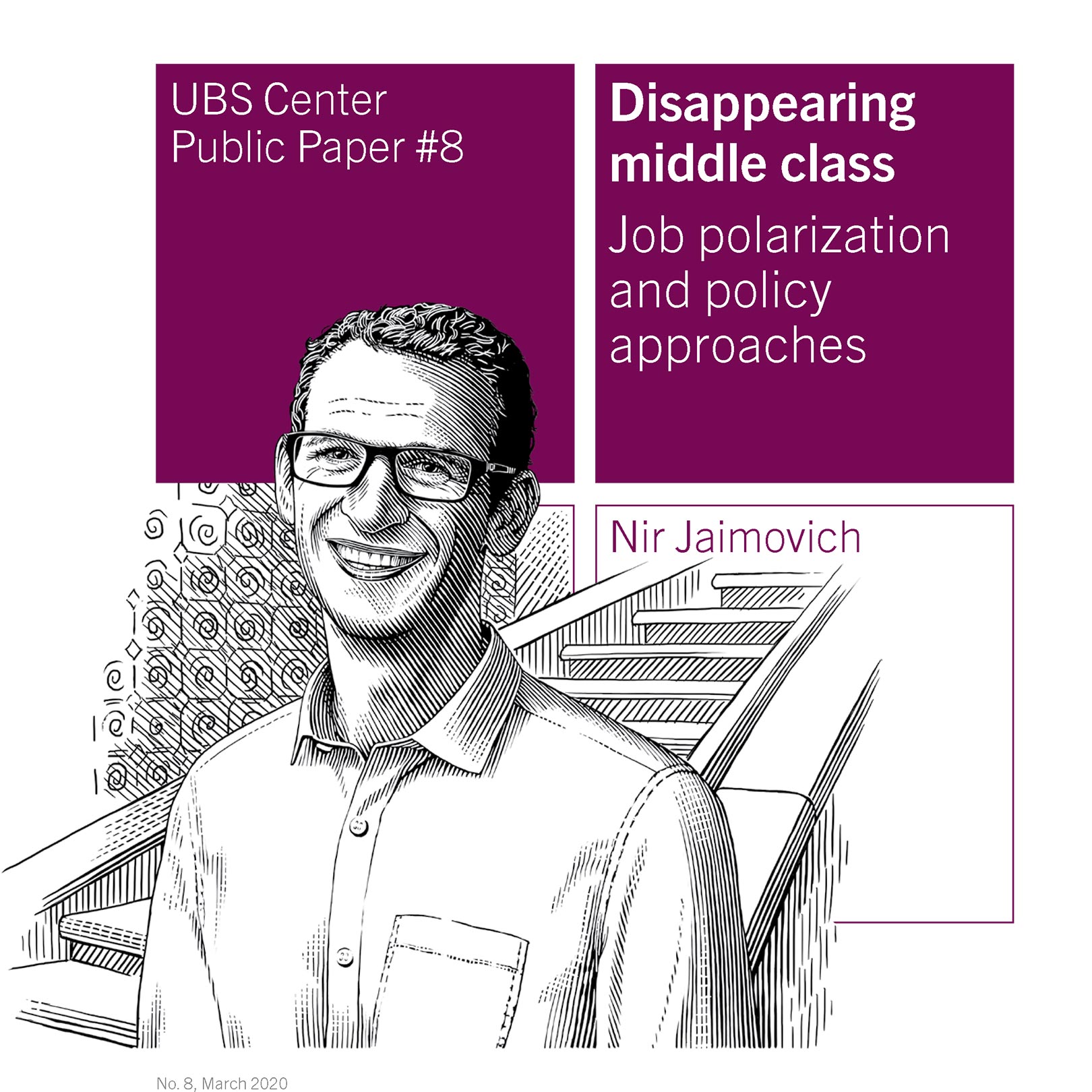Disappearing middle class
Livestream
Evaluating policy options
In the last four decades, many industrialized economies have experienced the phenomenon of "job polarization,” where the fraction of the population working in middle-waged jobs has dropped. This process has been linked to automation, which replaces specific tasks of human labor. What happens to people who possess skills that are being replaced? And what options do governments have for coping with such changes?
Nir Jaimovich answered these and similar questions in his webinar on June 23 at 17:00 CET.
This was a public event with free access via livestream on our website.
This session was supported by the Centre for Economic Policy Research (CEPR).
Read our Twitter thread.
In the last four decades, many industrialized economies have experienced the phenomenon of "job polarization,” where the fraction of the population working in middle-waged jobs has dropped. This process has been linked to automation, which replaces specific tasks of human labor. What happens to people who possess skills that are being replaced? And what options do governments have for coping with such changes?
Nir Jaimovich answered these and similar questions in his webinar on June 23 at 17:00 CET.

Topic summary
Disappearing middle class
The creeping hollowing out of the middle class and the rapidly advancing automation are central topics among policymakers, and there is certainly no shortage of dire predictions about the ascent of robots and subsequent obsolescence of workers. But – doomsday prophecies aside – what are the facts? What is happening to workers, specifically middle-class ones? And, from a policy perspective, what can (or should) be done to address this fundamental shift in who – or what – does which jobs? Nir Jaimovich’s Public Paper tackles these questions head-on. He first identifies the types of individuals who are likely to work in middle-class occupations and tracks how they act on the labor market outcomes. Then he evaluates policies proposed in recent years that have been aimed at combating the labor market malaise middle-class workers have experienced.
You can download a free copy here.
The creeping hollowing out of the middle class and the rapidly advancing automation are central topics among policymakers, and there is certainly no shortage of dire predictions about the ascent of robots and subsequent obsolescence of workers. But – doomsday prophecies aside – what are the facts? What is happening to workers, specifically middle-class ones? And, from a policy perspective, what can (or should) be done to address this fundamental shift in who – or what – does which jobs? Nir Jaimovich’s Public Paper tackles these questions head-on. He first identifies the types of individuals who are likely to work in middle-class occupations and tracks how they act on the labor market outcomes. Then he evaluates policies proposed in recent years that have been aimed at combating the labor market malaise middle-class workers have experienced.
You can download a free copy here.

Related press
Will the covid-19 pandemic accelerate automation? Economist 22.4.2020 read
Speakers
Nir Jaimovich ist ein Makroökonom, der sich mit Konjunkturzyklen und der Dynamik des Arbeitsmarktes befasst. Er ist wissenschaftlicher Mitarbeiter am Centre for Economic Policy Research (CEPR) und Mitherausgeber des Journal of Monetary Economics und des Journal of Economic Theory. Bevor er an die Universität Zürich kam, war Professor Jaimovich an der Fakultät der Marshall School of Business an der USC, der Duke University, der Stanford University und der University of California, San Diego, tätig. Darüber hinaus war er wissenschaftlicher Mitarbeiter im Rahmen des Programms "Economic Fluktuationen und Wachstum" des National Bureau of Economic Research (NBER).
Ernst Fehr promovierte 1986 an der Universität Wien. Seine Arbeit hat gezeigt, wie soziale Motive die Zusammenarbeit, Verhandlungen und Koordination zwischen Akteuren beeinflussen und wie sich dies auf das Funktionieren von Anreizen, Märkten und Organisationen auswirkt. Seine Arbeit identifiziert wichtige Bedingungen, unter denen die Zusammenarbeit floriert und zusammenbricht. Die Arbeit an den psychologischen Grundlagen von Anreizen informiert uns über die Vorzüge und Grenzen finanzieller Anreize für die Vergütung von Mitarbeitern. In anderen Arbeiten hat er die Bedeutung der Unternehmenskultur für die Leistung von Unternehmen gezeigt. In neueren Arbeiten zeigt er, wie sich soziale Motive darauf auswirken, wie Menschen über Fragen im Zusammenhang mit der Umverteilung von Einkommen abstimmen und wie Unterschiede in der inneren Geduld der Menschen mit der Ungleichheit des Wohlstands zusammenhängen. Seine Arbeit hat innerhalb und außerhalb der Wissenschaft mit mehr als 100.000 Zitaten von Google Scholar große Resonanz gefunden, und seine Arbeit wurde mehrfach in internationalen und nationalen Zeitungen erwähnt.
Nir Jaimovich ist ein Makroökonom, der sich mit Konjunkturzyklen und der Dynamik des Arbeitsmarktes befasst. Er ist wissenschaftlicher Mitarbeiter am Centre for Economic Policy Research (CEPR) und Mitherausgeber des Journal of Monetary Economics und des Journal of Economic Theory. Bevor er an die Universität Zürich kam, war Professor Jaimovich an der Fakultät der Marshall School of Business an der USC, der Duke University, der Stanford University und der University of California, San Diego, tätig. Darüber hinaus war er wissenschaftlicher Mitarbeiter im Rahmen des Programms "Economic Fluktuationen und Wachstum" des National Bureau of Economic Research (NBER).
Ernst Fehr promovierte 1986 an der Universität Wien. Seine Arbeit hat gezeigt, wie soziale Motive die Zusammenarbeit, Verhandlungen und Koordination zwischen Akteuren beeinflussen und wie sich dies auf das Funktionieren von Anreizen, Märkten und Organisationen auswirkt. Seine Arbeit identifiziert wichtige Bedingungen, unter denen die Zusammenarbeit floriert und zusammenbricht. Die Arbeit an den psychologischen Grundlagen von Anreizen informiert uns über die Vorzüge und Grenzen finanzieller Anreize für die Vergütung von Mitarbeitern. In anderen Arbeiten hat er die Bedeutung der Unternehmenskultur für die Leistung von Unternehmen gezeigt. In neueren Arbeiten zeigt er, wie sich soziale Motive darauf auswirken, wie Menschen über Fragen im Zusammenhang mit der Umverteilung von Einkommen abstimmen und wie Unterschiede in der inneren Geduld der Menschen mit der Ungleichheit des Wohlstands zusammenhängen. Seine Arbeit hat innerhalb und außerhalb der Wissenschaft mit mehr als 100.000 Zitaten von Google Scholar große Resonanz gefunden, und seine Arbeit wurde mehrfach in internationalen und nationalen Zeitungen erwähnt.